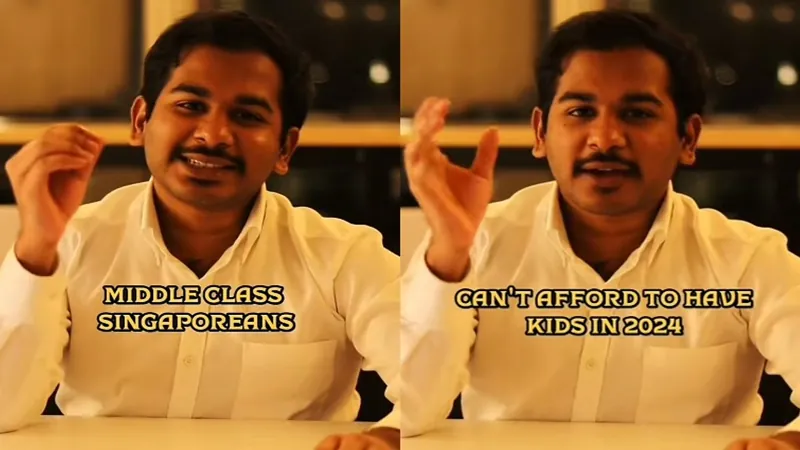
Raising Kids in Singapore in 2024: Is it Really Sustainable for the Middle Class?
2024-11-26
Author: Mei
SINGAPORE: A startling revelation from financial consultant Devnavin Madeswaran is shaking the foundations of parenting in Singapore. In a viral TikTok video, he boldly declared, 'Middle-class Singaporeans can’t afford to have kids in 2024,' a claim that has sparked widespread debate about the true costs of raising children in this affluent city-state.
Changing Times: From Labor to Luxury
In his 3-minute clip, Mr. Madeswaran reflects on the shifting societal perspective on parenting. In previous generations, children were seen as an asset, contributing to family businesses or farms, but in today's urbanized world, this dynamic has shifted dramatically. He argues that children have now morphed into what he, alongside geopolitical analyst Peter Zeihan, terms 'an expensive hobby.'
Mr. Madeswaran insists that the financial burden of raising children has become so overwhelming that many middle-class families find it less a joyful venture and more akin to a punishment. With rising living costs, parents are realizing they can no longer count on their children to support them in their twilight years. 'We don’t want our kids to endure the same burdens we do,' he notes.
A Jaw-Dropping Price Tag: Over $300,000 to Raise a Child
The statistics he shared from the financial platform Seedly are alarming. Raising a child from birth through university in Singapore can cost an astonishing $290,009 to as much as $360,783. These figures break down into several stages: - From pregnancy, expenditures range from $5,055 to $27,001. - The infant years alone add another $44,113 to $92,941. - Costly toddler years tally approximately $27,112. - Primary school entails $68,541, followed by secondary school at $50,267, pre-university at $24,876, and university a staggering $69,945.
While these numbers may seem manageable, Mr. Madeswaran emphasizes that they represent only the baseline. The 'hidden costs' associated with raising a child—such as private tuition, extracurriculars, and other educational opportunities—can exponentially increase the financial strain.
The Education Crisis: The Competition is Fierce
In a society where academic performance can dictate a child's future, parents are increasingly feeling pressured to invest heavily in their child's education. Mr. Madeswaran reports that about 70% of parents in Singapore enroll their children in tuition classes, with statistics showing that among primary school parents, 80% seek private tutoring.
The competition is intense, with some parents reportedly spending exorbitant amounts on tuition fees just to ensure their children keep up. For example, a Singaporean mother spends $2,000 per term on her daughter’s tuition, a shocking testament to the lengths parents will go to secure their child's future.
The divide is even more pronounced when considering the advantages wealthy families have. They often employ 'super tutors'—highly experienced educators whose demand and fees can skyrocket, offering their children a significant edge in gaining admission to prestigious universities.
The Societal Impact: A Call for Change?
As Mr. Madeswaran concluded his talk, he posed a critical question: 'Is this really just a parent's lack of ability, or perhaps a wider systemic issue? Are we masochistic for choosing to procreate in a society that punishes parents with a financial burden?'
This situation resonates with many Singaporeans. While some netizens applaud Madeswaran's insights, others argue that everyone can succeed with dedication, regardless of financial standing. The discourse continues, highlighting the ongoing societal challenge of balancing aspirations with economic realities.
As discussions unfold, the pressing question remains: How will middle-class families navigate the landscape of parenting in a city where financial capacity increasingly defines a child's future? With the costs continually rising, prospective parents may find themselves at a crossroads, reconsidering the prospects of starting a family in Singapore's competitive milieu.

 Brasil (PT)
Brasil (PT)
 Canada (EN)
Canada (EN)
 Chile (ES)
Chile (ES)
 España (ES)
España (ES)
 France (FR)
France (FR)
 Hong Kong (EN)
Hong Kong (EN)
 Italia (IT)
Italia (IT)
 日本 (JA)
日本 (JA)
 Magyarország (HU)
Magyarország (HU)
 Norge (NO)
Norge (NO)
 Polska (PL)
Polska (PL)
 Schweiz (DE)
Schweiz (DE)
 Singapore (EN)
Singapore (EN)
 Sverige (SV)
Sverige (SV)
 Suomi (FI)
Suomi (FI)
 Türkiye (TR)
Türkiye (TR)